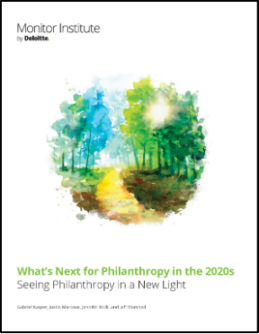
In a new survey of major trends in philanthropy by the Deloitte consulting firm’s Monitor Institute, What’s Next for Philanthropy in the 2020s: Seeing Philanthropy in a New Light, there’s a brief account of the collective “action plan” of Los Angeles foundations to redirect government spending into permanent supportive housing. Deloitte highlights the grantmaking effort as something for replication elsewhere, with no mention of the widespread sense in L.A. itself that it was a waste of time, energy, and resources, that has done nothing to alleviate the problem of homelessness there.
It is exemplary, but of something else entirely—on which Deloitte’s “new light” sheds none.
Specifically, according to the report by Deloitte’s Gabriel Kasper, Justin Marcoux, Jennifer Holk, and Jeff Morshed—citing a document from the Conrad N. Hilton Foundation—
In Los Angeles, a consortium of 30 philanthropic funders—including the Conrad N. Hilton Foundation, California Community Foundation, United Way of Greater Los Angeles, The California Endowment, Weingart Foundation, and many others, collaborated in an effort to influence government policies around homelessness and supportive housing. The funders supported nonprofits focused on homelessness, engaged housing developers, and built political support by raising public awareness through media campaigns and education about permanent solutions to homelessness. This long-term investment by funders in organizations focused on permanent housing led to instrumental change in Los Angeles. Nonprofit organizations passed Proposition HHH in 2016 and Measure H in 2017, which called for building upward of 10,000 permanent supportive housing and raising $3.5B in public sector revenue over 10 years, respectively—in addition to other policy wins.
That’s quite a curious way of seeing “instrumental change.” If the instrumental change was passage of Proposition HHH and Measure H—by nonprofits, as Deloitte characterizes it, also curiously—that’s one thing. If the desired change was an actual, measurable reduction in homelessness, on the other hand, that’s another thing. According to a 2020 report by city controller Ron Galperin, Los Angeles’ homeless population had increased by 45% since 2016.
From the for-hire, advice-offering Deloitte, What’s Next for Philanthropy in the 2020s is part of a larger project—funded by Deloitte Tax LLP and the Robert Wood Johnson, John D. and Catherine T. MacArthur, W. K. Kellogg, and McConnell Foundations—to “help foundations and donors in the United States and Canada reflect on the current state of philanthropic practice and explore new possibilities, models, and interventions for the future,” by its own description.
Its commendation of philanthropy’s role addressing homelessness in L.A. is actually too eerily consistent with old ways of philanthropic thinking—getting at a perceived “root cause,” with a fashionable “theory of change,” collaboratively with other bureaucratic elites in the philanthropic infrastructure’s clerisy, ultimately including via advocacy as part of a political process, to fully leverage the necessary additional taxpayer resources.
Not a “new light” at all, really, in other words, but exemplary of the same shades of an unquestioning monoculture among establishment progressive grantmakers with which we’re all increasingly familiar.